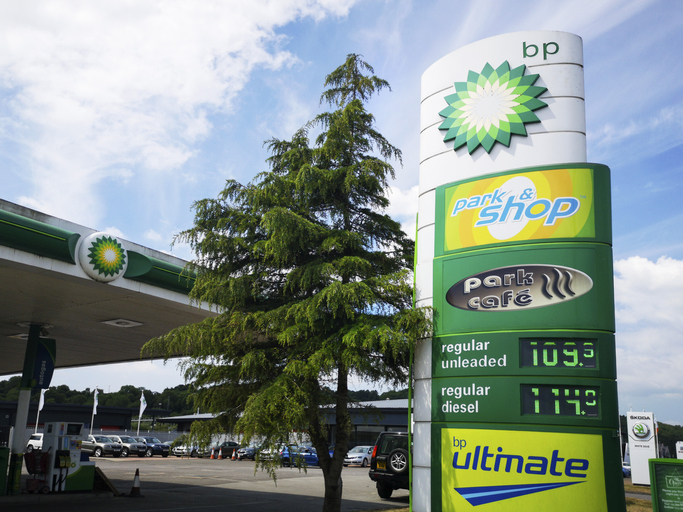ii view: Can BP dividend survive switch to greener world?
If Covid-19 accelerates the pace of environmental change, then this oil giant wants to be ready.
15th June 2020 12:24
by Keith Bowman from interactive investor
If Covid-19 accelerates the pace of environmental change, then this oil giant wants to be ready.

Revising fuel price assumptions and taking a value write-down
- Oil price assumption down 30% to $55 per barrel
- A write-down of up to $17.5 billion (£13.9 billion)
Chief executive Bernard Looney said:
"We have been in action, developing our strategy to become a more diversified, resilient and lower carbon company. As part of that process, we have been reviewing our price assumptions over a longer horizon. That work has been informed by the Covid-19 pandemic, which increasingly looks as if it will have an enduring economic impact.
"So, we have reset our price outlook to reflect that impact and the likelihood of greater efforts to 'build back better' towards a Paris-consistent world. We are also reviewing our development plans. All that will result in a significant charge in our upcoming results, but I am confident that these difficult decisions - rooted in our net zero ambition and reaffirmed by the pandemic - will better enable us to compete through the energy transition."
ii round-up:
Oil giant BP (LSE:BP.) today revised down its long-term expectations for fuel prices in the wake of the Covid-19 pandemic, and outlined plans to take a write-down charge of up to $17.5 billion (£13.9 billion) in its second-quarter results.
The pandemic is now expected to lead to a faster transition away from fossil fuels, BP says. Its share price fell by more than 5% in early UK trading, having fallen by over 30% year-to-date. The oil price is down by around 40% during 2020 while shares of rival Royal Dutch Shell (LSE:RDSB) have dropped by just over 40%.
Brent crude oil prices are now expected to average around $55 a barrel between 2021 and 2050 and Henry Hub gas around $2.90 per million British thermal units. Both assumptions are down around 30% on management’s previous estimates.
It also revised upwards the assumed price it will have to pay governments for carbon dioxide emissions to $100 per tonne of CO2 in 2030 from a previous $40 a tonne.
In February, BP announced plans to become a net zero carbon company by 2050 or sooner, in line with the 2015 Paris climate change agreement.
It has subsequently been developing its strategy to create a more diversified, resilient and lower-carbon energy company, bearing down on costs and strengthening its finances.
BP now estimates that charges to write-down the value of property, plant & equipment and exploration intangibles will total up to $17.5 billion.
Second-quarter results are scheduled for the 4 August.
ii view:
BP operates in over 75 countries around the world. It has, over recent years, been navigating a multitude of difficulties and opportunities. Payments in relation to the disastrous 2010 Gulf of Mexico oil spillage are still being made, while its previous acquisition of assets from miner BHP (LSE:BHP) helped fuel an earlier rise in net debt.
Now, Covid-19 has hit the world economy for six. A combination of falling demand from Covid lockdowns and travel restrictions, and a disagreement between major oil producers Saudi Arabia and Russia regarding supply cuts, has left the oil price floundering. Lifestyle adjustments made under the pandemic, including more working from home and less commuting, are also underlining the possibilities for change required in order to meet climate change initiatives previously agreed by governments across the world.
For investors, BP is taking action to address the stark backdrop. Cost cuts, business disposals and reductions in capital expenditure are all being pursued. Quickening its pace of change to meet environmental goals and address a faster transition away from fossil fuels in the wake of the pandemic, also looks sensible.
But, unlike rival Shell, BP has not reduced its dividend to deal with the financial fallout from Covid-19, and there was no mention of the payout today. A historic dividend yield of over 10% is highly attractive in today’s Covid constrained and ultra-low interest rate environment. Whether a cut will eventually come, only time will tell. That said, the relatively new chief executive appears in touch with the need for environmental change, a trait which could prove long-term positive for shareholders.
Positives:
- Attractive dividend payment (not guaranteed)
- Cash conserving actions being taken
- Accelerating environmental changes
Negatives:
- Charges of up to $17.5 billion to hit Q2 results
- Q1 net debt up 13% to £51 billion
- Second-quarter upstream production expected to fall
The average rating of stock market analysts:
Buy
These articles are provided for information purposes only. Occasionally, an opinion about whether to buy or sell a specific investment may be provided by third parties. The content is not intended to be a personal recommendation to buy or sell any financial instrument or product, or to adopt any investment strategy as it is not provided based on an assessment of your investing knowledge and experience, your financial situation or your investment objectives. The value of your investments, and the income derived from them, may go down as well as up. You may not get back all the money that you invest. The investments referred to in this article may not be suitable for all investors, and if in doubt, an investor should seek advice from a qualified investment adviser.
Full performance can be found on the company or index summary page on the interactive investor website. Simply click on the company's or index name highlighted in the article.